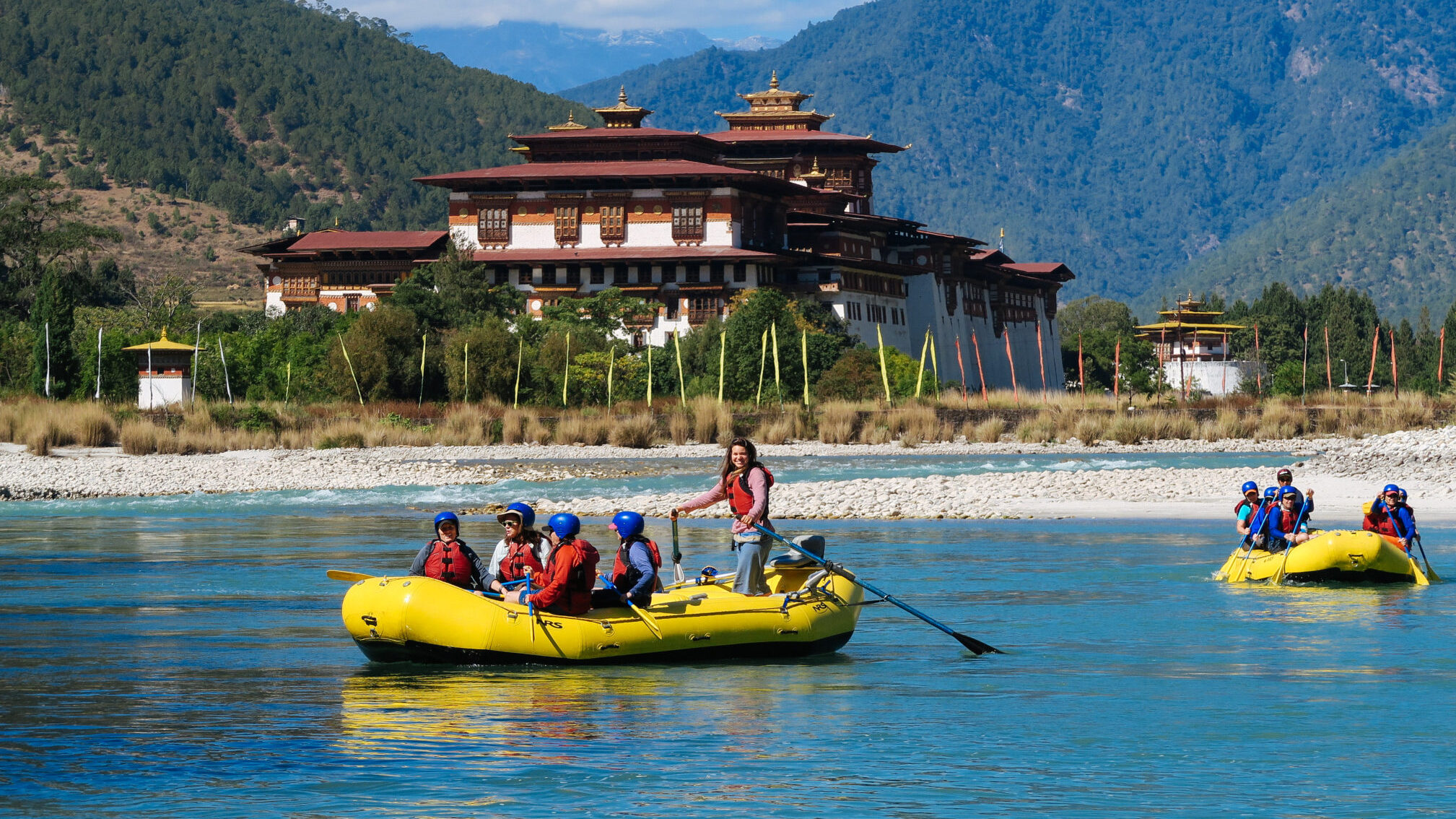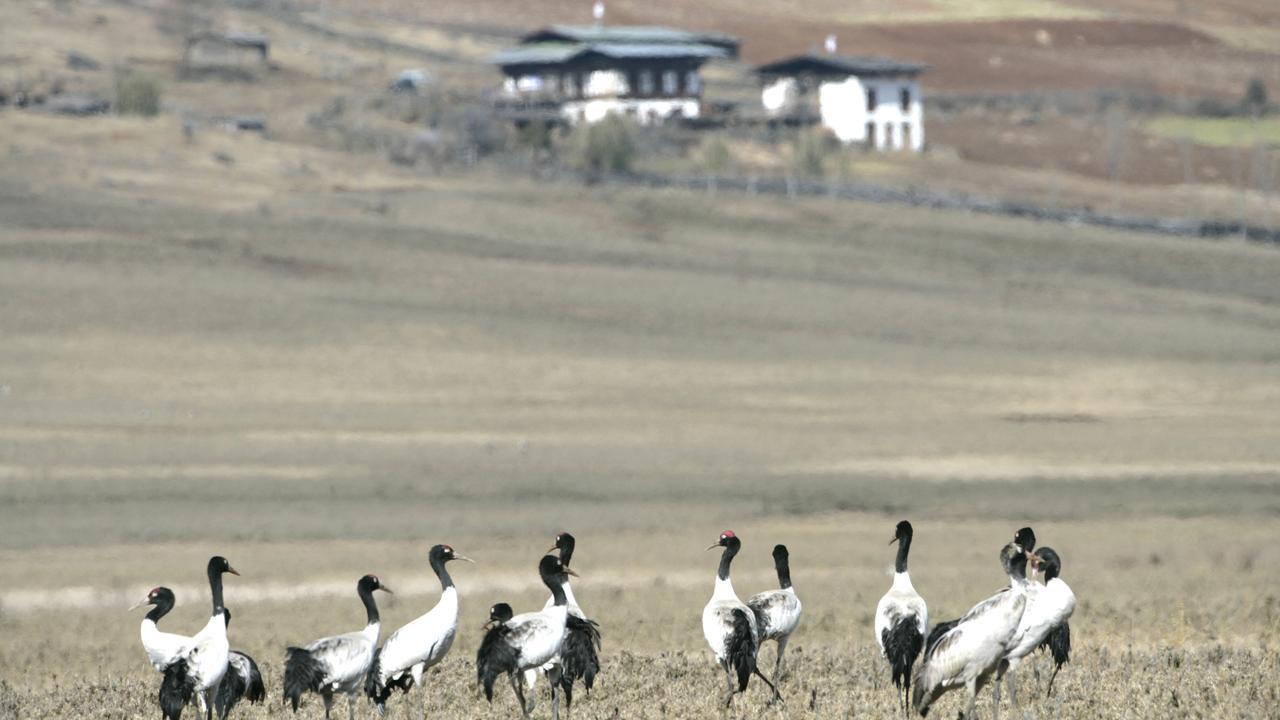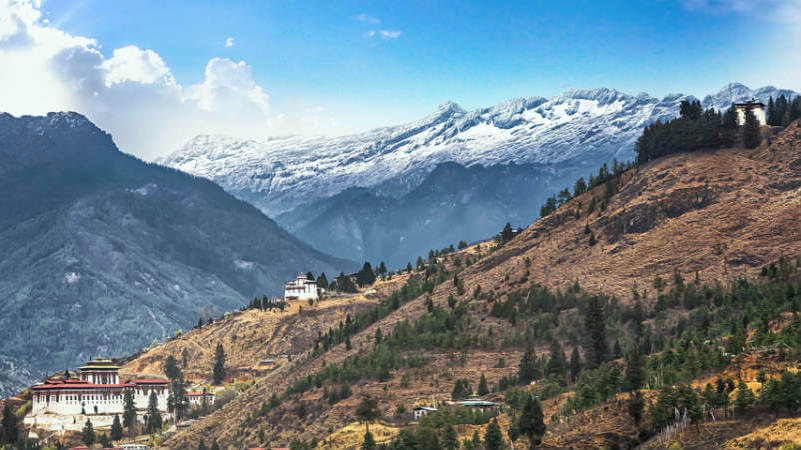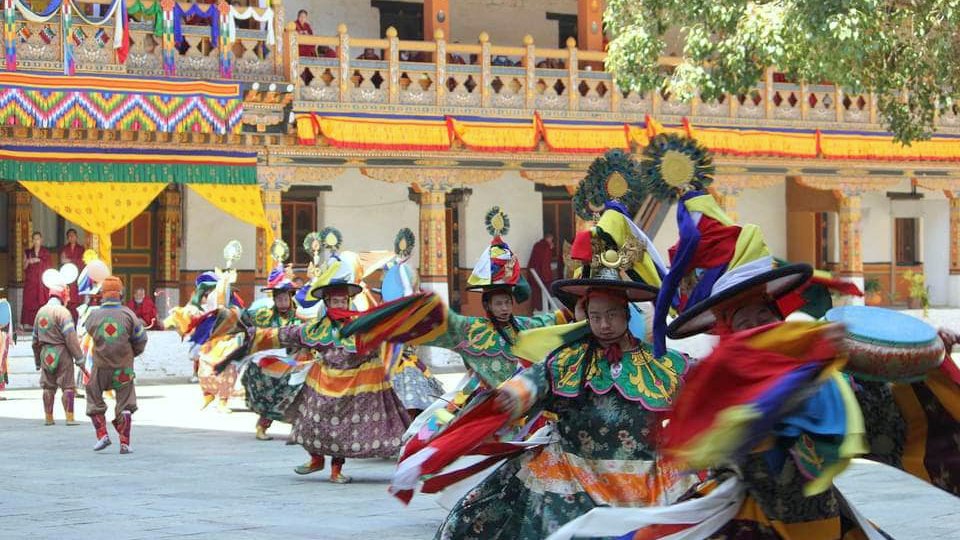Experience the enchanting beauty of Off Season Travel Bhutan during the quieter months. Whether you're seeking the serenity of Bhutan Winter Travel or the lush vibrancy of Summer Travel in Bhutan, traveling in the low season provides a chance to explore with fewer tourists and at more affordable prices. Discover unique cultural experiences in a Quiet Season Bhutan Tour, benefit from Bhutan Off Season Discounts, and enjoy a more authentic journey through this Himalayan paradise. Ideal for those seeking a Less Crowded Time to Visit Bhutan, off-season travel is perfect for engaging in Bhutan Cultural Trips Low Season and participating in vibrant local festivals.
At Amen Bhutan Tours and Treks, we pride ourselves on being the best company for Off Season Travel Bhutan. Our expert knowledge and tailored services provide travelers with a unique and immersive experience during Bhutan's quieter months. Whether you're interested in the serene landscapes of Bhutan Winter Travel or the lush greenery of Summer Travel in Bhutan, our tours are designed to offer you the best of Bhutan with Bhutan Off Season Discounts and fewer crowds. With us, you'll discover the rich cultural tapestry of Bhutan through intimate, less crowded tours, and benefit from the personal touch that only a seasoned local operator like Amen Bhutan Tours and Treks can provide.
Cost-Effectiveness
Traveling to Bhutan during the off-season can be significantly more cost-effective compared to the peak tourist periods. Here’s how Cost-Effectiveness plays a major role in making off-season travel to Bhutan an attractive option:
- Lower Travel Costs: Airfare and transportation costs are generally lower during the off-season. Airlines and bus services may offer discounts to attract more travelers when demand is lower.
- Accommodation Deals: Hotels and lodges are likely to lower their rates during off-peak months to maintain occupancy rates. This can result in substantial savings on accommodation expenses.
- Discounted Tour Packages: Tour operators, like Amen Bhutan Tours and Treks, often provide attractive discounts on their tour packages during the off-season. These packages can include guided tours, meals, and sometimes even special activities at reduced rates.
- Negotiable Prices: With fewer tourists around, there is more room to negotiate prices for various services, including guides, private transport, and even local handicrafts.
- Extended Stays for Less: The savings accrued from lower daily costs make it feasible for travelers to extend their stays without significantly increasing their overall budget. This allows for a more in-depth exploration of Bhutan.
- Overall Value: The overall value of traveling during the off-season is enhanced by the combination of lower costs and fewer tourists. You get to enjoy a richer travel experience with more personal space and attention, without the premium prices associated with peak seasons.
By taking advantage of these cost-effective benefits, travelers can enjoy the full beauty and cultural richness of Bhutan while managing their budget more effectively.
Less Crowded
Traveling to Bhutan during the off-season offers a distinctly Less Crowded experience, which can greatly enhance the quality of your visit. Here are some of the key benefits of visiting Bhutan when there are fewer tourists:
- Personalized Experiences: With fewer visitors, tour guides and locals have more time to devote to each guest. This means more personalized tours, in-depth conversations, and a chance to gain deeper insights into the local culture and traditions.
- Easier Access to Popular Sites: Bhutan’s famous sites like the Tiger's Nest Monastery, Punakha Dzong, and Paro Taktsang are much less crowded during the off-season. This allows for a more contemplative and enjoyable visit without the rush and long waits often experienced during peak times.
- More Interaction with Locals: Fewer tourists mean that locals are not overwhelmed by visitors and can engage more genuinely. This is a great opportunity to learn about the Bhutanese way of life, their festivals, and daily routines, creating a more authentic and memorable experience.
- Tranquil Nature Experiences: Nature walks, treks, and other outdoor activities are more peaceful as the trails and parks are less frequented. This tranquility enhances the natural beauty of Bhutan’s landscapes, allowing you to truly immerse yourself in the environment.
- Better Services: Hotels and restaurants can offer better service when they are not operating at full capacity. Staff can focus more on individual guest needs, improving the overall quality of service.
- Authentic Festival Experiences: Although festivals are a big draw for tourists, visiting during less popular festival times or smaller local events can provide a more intimate glimpse into the cultural fabric of Bhutan.
- Photography Opportunities: Fewer tourists also mean fewer obstructions when taking photos. You can take your time to get the perfect shot of Bhutan’s monasteries, landscapes, and townscapes without having to maneuver around large tour groups.
Visiting Bhutan during the off-season not only means less crowding but also contributes to a more relaxed and enriching travel experience, allowing you to connect more deeply with the place and its people.
Rich Cultural Interactions
Visiting Bhutan during the off-season facilitates Rich Cultural Interactions that are often more difficult to achieve during busier times. Here’s how the off-season enhances these cultural experiences:
-0.jpg)
- Deeper Engagement with Locals: With fewer tourists around, locals have more time and willingness to engage in longer, more meaningful conversations. This is an opportunity to learn directly about Bhutanese life, their customs, traditions, and even their personal views, providing a richer understanding of the local culture.
- Participation in Daily Activities: During off-peak periods, travelers may have the chance to participate in daily activities with local families or communities. Whether it’s helping in the fields, attending a local school event, or cooking traditional meals, these experiences are invaluable for cultural immersion.
- Invitations to Local Homes: Bhutanese are known for their hospitality. In quieter times, it's not uncommon for visitors to be invited into homes for a meal or tea, offering a rare glimpse into Bhutanese domestic life and hospitality customs.
- Authentic Cultural Events: While the famous festivals are a major draw, the off-season might coincide with smaller, local festivals not usually witnessed by the average tourist. These events are typically traditional and less commercialized, offering a more authentic cultural experience.
- Learning Traditional Crafts: With more relaxed schedules, artisans may be more available to teach visitors about traditional Bhutanese crafts like weaving, thangka painting, or wood carving. This kind of hands-on learning is a deep dive into the artistry that is a core part of Bhutan’s cultural identity.
- Insightful Guided Tours: Guides can offer more tailored and in-depth tours when they are not managing large groups. This means they can provide more detailed information and answer questions more thoroughly, enhancing your understanding of the sites and their historical and cultural significance.
- Community Events: Attending a local sports match, a school function, or a village gathering can provide unique insights into the communal aspects of Bhutanese culture. These events are where the social fabric of the community is most visible.
- Monastic Life Observations: Visiting monasteries during quieter times may allow for more interaction with monks and a chance to observe or even participate in daily prayers and rituals, providing a deeper understanding of Bhutanese spirituality.
These Rich Cultural Interactions during the off-season enrich your travel experience, turning a simple visit into a profound journey through the heart and soul of Bhutan.
Unique Seasonal Activities
Traveling to Bhutan during the off-season allows you to engage in Unique Seasonal Activities tailored to the specific characteristics of winter and summer. Here’s a look at what you can expect:

Winter Activities (December to February)
- Scenic Hot Stone Baths: Experience traditional Bhutanese hot stone baths, which are particularly enjoyable during the cold winter months. These baths are not only relaxing but also believed to have medicinal properties.
- Snow Trekking: For the adventurous, some trek routes remain open during the winter, offering spectacular views of the snow-covered Himalayas.
- Bird Watching: Winter is a great time for bird enthusiasts as migratory birds visit Bhutan. Areas like Phobjikha Valley become hotspots for spotting rare species.
- Festival Participation: Winter festivals such as the Punakha Drubchen and Tshechu offer unique cultural insights and spectacular performances in a less crowded setting.
Summer Activities (June to August)
- Mushroom Picking: The moist conditions of the monsoon season make it ideal for mushroom foraging, a popular activity among locals. You can join in and learn how to safely identify and collect various edible mushrooms.
- Valley Hikes: Though trekking high-altitude paths might be challenging during the monsoon, lower valley hikes are lush and vibrant, offering breathtaking views and encounters with abundant flora and fauna.
- Photography Tours: The monsoon season transforms Bhutan into a photographer’s paradise, with vibrant greenery, blooming flowers, and misty landscapes providing exceptional photography opportunities.
- River Rafting: The increased water levels in rivers make for thrilling white-water rafting experiences, available in rivers like the Po Chu and Mo Chu.
Year-Round Activities
- Cultural Workshops: Participate in cultural workshops where you can learn traditional arts such as thangka painting, pottery, or Bhutanese cooking. These workshops often have more availability during off-season months.
- Archery Competitions: Archery is Bhutan’s national sport, and competitions are more frequent and less crowded during off-peak times. Visitors can watch or even participate in local archery matches.
- Wellness Retreats: Engage in wellness activities like yoga and meditation retreats, which are particularly peaceful when the tourist crowds are away.
These Unique Seasonal Activities not only enhance your travel experience but also allow you to see a side of Bhutan that remains hidden during the peak tourist seasons. Each season brings its own charm and set of possibilities, making off-season travel a rich and rewarding adventure.
Diverse Wildlife Sightings
Traveling to Bhutan during the off-season can be particularly rewarding for wildlife enthusiasts, as it offers opportunities for Diverse Wildlife Sightings. Here’s a glimpse into the rich wildlife experiences Bhutan offers throughout the quieter months:

Winter Wildlife (December to February)
- Black-Necked Cranes: The Phobjikha Valley in central Bhutan becomes a winter home for the rare black-necked cranes that migrate from the Tibetan Plateau. These elegant birds are revered in Bhutanese culture and observing their graceful dances is a highlight.
- Snow Leopards: Although elusive, the snow leopard is more likely to be spotted during the winter months in the higher altitudes of Bhutan. Their tracks can often be seen in the fresh snow, adding an element of excitement to treks.
- Barking Deer and Blue Sheep: These animals are more visible during winter as they descend to lower altitudes in search of food, providing excellent opportunities for sightings.
Summer Wildlife (June to August)
- Butterflies and Insects: The monsoon season brings out a vibrant array of butterflies and other insects, particularly in the subtropical and temperate zones of Bhutan. The country is known for its rich biodiversity in butterfly species.
- Birdwatching: Summer is an excellent time for birdwatching as the forests are alive with the sounds of numerous resident and migratory birds. From the rare hornbills to the vibrant trogons, the diversity is spectacular.
- Flora in Full Bloom: The rich greenery and blooming flowers attract a variety of wildlife, making it a great time to observe animals in their natural habitat.
Unique Encounters
- Endemic Species: Bhutan is home to several endemic species such as the Bhutan Glory butterfly, the Bhutan red panda, and the golden langur. The off-season may increase the chances of encountering these rare species as fewer tourists and disturbances allow for more natural animal behavior.
- Guided Wildlife Tours: Taking a wildlife tour with expert local guides enhances the likelihood of spotting these creatures while ensuring that you maintain a safe and respectful distance, preserving both your safety and the well-being of the wildlife.
Conservation Areas
- Protected Parks and Reserves: Bhutan’s commitment to maintaining a substantial portion of its land under conservation means well-managed national parks and wildlife sanctuaries that offer sustainable wildlife watching experiences. Parks like Jigme Dorji National Park and Royal Manas National Park are known for their diverse ecosystems.
Visiting Bhutan during the off-season not only offers the advantage of fewer crowds but also increases the chances of witnessing wildlife in more solitary and serene settings. This can make for both a peaceful and thrilling wildlife watching experience, deeply enriched by the untouched natural beauty of Bhutan.
Comfortable Weather
Traveling to Bhutan during the off-season can still offer Comfortable Weather, despite what many might expect. Here's a breakdown of the weather conditions you can anticipate and how they can contribute to a pleasant travel experience:

Winter Comfort (December to February)
- Clear Skies and Sunshine: Winter in Bhutan is marked by bright, sunny days, especially in the western regions. The clear skies provide stunning views of the snow-capped Himalayas.
- Crisp Air: The air is refreshingly crisp and invigorating, ideal for trekking and sightseeing. Although the mornings and evenings can be cold, daytime temperatures are generally comfortable for outdoor activities.
- Less Humidity: Lower humidity during winter means the cold is more tolerable, making it easier to layer up and stay warm while exploring.
Summer Comfort (June to August)
- Pleasant Temperatures: Unlike the scorching summers experienced in many parts of South Asia, Bhutan’s summer temperatures are relatively mild, thanks to its elevation. Even during the monsoon, the temperatures remain pleasant.
- Refreshing Rains: Rainfall during the summer can be quite refreshing, breaking the continuity of warmer days and bringing a cool change to the environment.
- Lush Landscapes: The rain also nourishes the landscape, making it vibrantly green and beautiful, which can be a delight to explore under light rain with the right waterproof gear.
Both winter and summer offer their own unique sets of weather conditions that, with a little preparation, can contribute to a comfortable and enjoyable travel experience in Bhutan.
Festivals and Events
Traveling to Bhutan during the off-season doesn't mean missing out on the vibrant cultural tapestry of festivals and events. Here’s an overview of some unique Festivals and Events you can experience outside the peak tourist periods:

Winter Festivals (December to February)
- Punakha Drubchen and Tshechu: These festivals commemorate Bhutan's victory over Tibetan invaders. The Drubchen showcases a dramatic recreation of the 17th-century battle scene, and the Tshechu follows with spiritual mask dances, music, and a display of a giant thangka.
- Trongsa Tshechu: Held in the impressive Trongsa Dzong, this festival is a vibrant display of Bhutanese cultural and religious life with various mask dances and cultural performances.
- Druk Wangyel Tshechu: Unique to the Dochula Pass, this festival features mask dances performed by the Royal Bhutan Army rather than monks, offering a different perspective on Bhutanese cultural celebrations.
Summer Festivals (June to August)
- Nimalung Tshechu: Held in the Nimalung Monastery, this festival features three days of mask dances and religious celebrations, attracting locals who dress in their finest clothes for the occasion.
- Kurjey Tshechu: This is one of the most important religious events in Bumthang, celebrated on the 10th day of the 6th lunar month. It coincides with the birth anniversary of Guru Rinpoche. It’s a spiritual gathering that brings together both monks and laymen.
Lesser-Known Local Events
- Haa Summer Festival: A newer and lesser-known event that offers a chance to experience the nomadic lifestyles of the Haa Valley’s inhabitants. This festival showcases local cuisine, traditional sports, and religious performances.
- Mushroom Festival: Held in Genekha, this unique festival focuses on the mushroom picking season. It offers visitors the chance to learn about the diverse mushroom species of Bhutan, go on mushroom picking excursions, and taste dishes prepared with freshly harvested mushrooms.
Year-Round Cultural Immersion
- Temple Festivities: Many temples across Bhutan host small-scale local festivals that may not be widely advertised but are deeply cultural and spiritual. Participating in these events can provide a more intimate glimpse into the spiritual life of the local communities.
- Community Gatherings and Markets: Regular local markets or community gatherings can be as culturally rich as any festival, where you can observe and participate in the day-to-day lives of the Bhutanese people.
Attending these festivals and events during the off-season not only enriches your travel experience but also supports the local economy and promotes cultural heritage conservation. Each event offers a unique insight into the traditions, spirituality, and community spirit of Bhutan.
General Tips
Traveling to Bhutan during the off-season can offer a rewarding and unique experience if you’re well-prepared. Here are some general tips to help you make the most of your visit:
Plan Ahead
- Research and Book Early: Even in the off-season, popular activities and accommodations can fill up. Book your flights, hotels, and any guided tours well in advance.
- Check Event Calendars: Look up any local festivals or events happening during your visit to ensure you don’t miss out on unique cultural experiences.
Packing Essentials
- Dress in Layers: Bhutan’s weather can be unpredictable, especially during the off-season. Packing layers that can be easily added or removed allows you to stay comfortable throughout your trip.
- Rain Gear: If traveling during the monsoon season, waterproof clothing and umbrellas are essential. Waterproof boots can also be very useful for slippery trails.
- Sun Protection: Despite cooler temperatures, the sun can be quite strong, especially at higher altitudes. Bring sunscreen, sunglasses, and a hat.
Health and Safety
- Travel Insurance: Always travel with insurance that covers both health issues and potential travel disruptions.
- Stay Hydrated: High altitudes can lead to dehydration faster than at sea level. Drink plenty of water, and carry reusable water bottles that you can refill.
- Respect Local Customs: Bhutan has strong cultural traditions. Familiarize yourself with local customs and dress codes, especially when visiting religious sites.
Cultural Etiquette
- Ask Before Photographing: Always ask for permission before taking photos of people or religious ceremonies.
- Remove Shoes: When entering religious buildings or local homes, it is customary to remove your shoes.
- Use Right Hand: When giving or receiving something, use your right hand or both hands as a sign of respect.
Money Matters
- Carry Cash: While some places in Bhutan accept credit cards, smaller shops, markets, and rural areas typically operate on a cash basis.
- Currency Exchange: Make sure to exchange some money into local currency (Ngultrum) as it will be handy for small purchases and in areas where digital transactions are not available.
Stay Connected
- Local SIM Card: Consider purchasing a local SIM card for easier communication and access to internet services. This can be especially helpful in remote areas where Wi-Fi might not be reliable.
Following these tips will help you navigate Bhutan more comfortably and safely, enhancing your overall travel experience during the off-season.
Off-season travel in Bhutan offers a unique and rewarding experience, allowing you to explore the kingdom's stunning landscapes and rich cultural heritage without the crowds. With lower costs, better access to popular sites, and the opportunity for deeper interaction with locals, traveling during this time reveals a quieter, more authentic side of Bhutan. Whether you're trekking through serene trails, participating in local festivals, or simply enjoying the tranquility of nature, off-season travel in Bhutan can provide an unforgettable adventure enriched with personal growth and cultural insights. So, pack your bags and prepare for an intimate journey into the heart of the Himalayas!
FAQs on Off Season Travel in Bhutan
Q: What are the off-season months in Bhutan?
A: The off-season in Bhutan generally includes the summer months of June to August (monsoon season) and the winter months of December to February.
Q: Are there any benefits to traveling to Bhutan during the off-season?
A: Yes, there are several benefits, including lower travel costs, fewer tourists, more personal interactions with locals, and unique seasonal activities that aren’t available during the peak tourist season.
Q: Will I still be able to participate in cultural activities during the off-season?
A: Absolutely! Bhutan hosts a variety of cultural festivities and events year-round, with some unique to the off-season, offering a more intimate and authentic experience.
Q: What should I pack for off-season travel in Bhutan?
A: It’s important to pack layered clothing to accommodate varying temperatures, especially in winter. Waterproof clothing and sturdy footwear are essential for summer’s monsoon rains.
Q: Are travel and accommodation cheaper during the off-season?
A: Yes, travel and accommodation costs are generally lower during the off-season. Many hotels and tour operators offer discounts, making it a more budget-friendly option.
Q: Is it safe to travel to Bhutan during the monsoon and winter seasons?
A: Traveling to Bhutan during these seasons is generally safe, but it is always wise to check with your tour operator regarding any potential weather-related challenges. Road conditions can be tricky during the monsoon due to rainfall.
Q: Can I trek in Bhutan during the off-season?
A: While some high-altitude treks may be closed due to snow in winter or slippery conditions during the monsoon, there are several lower-altitude treks that are beautiful and accessible year-round.
Q: What are some must-see destinations in Bhutan during the off-season?
A: Key destinations like Paro, Thimphu, and Punakha are beautiful year-round, with winter offering clear views of the Himalayas and summer showcasing lush green landscapes.
Q: How do I handle health considerations in Bhutan’s off-season?
A: High altitudes can cause problems if not acclimatized properly, so drink plenty of water and take it easy for the first few days. Always have travel insurance that covers health issues.
Q: Are there any special considerations for visiting monasteries during the off-season?
A: Dress conservatively and respect the local customs. Monastic visits might offer more personal interactions with monks and a chance to participate in daily rituals, especially during quieter times.
If you are looking for tour packages in Bhutan please click here
If you need any further information, please contact us, Email: at [email protected] , Phone (Whatsapp or Viber) +975-1755-6636
